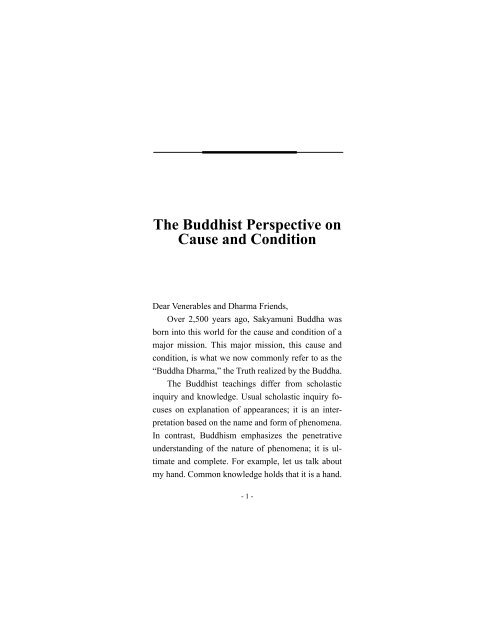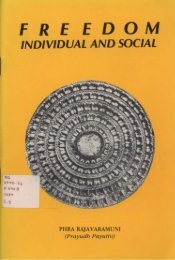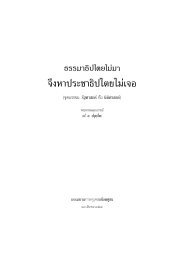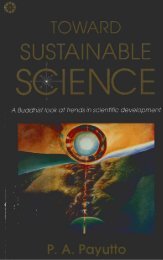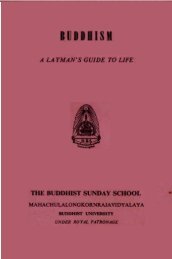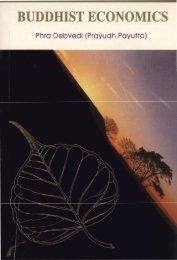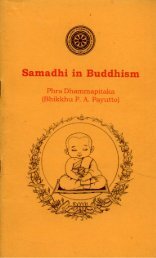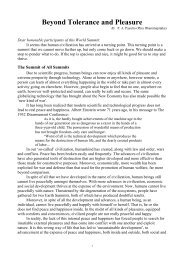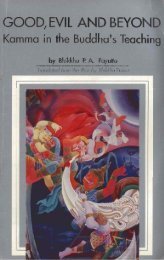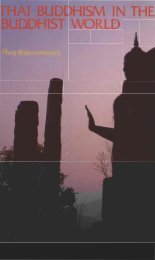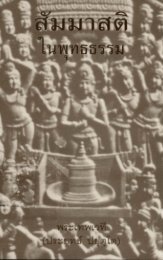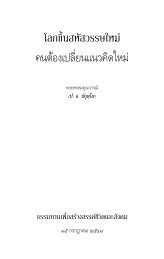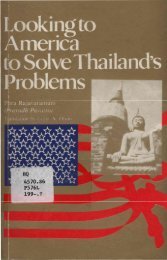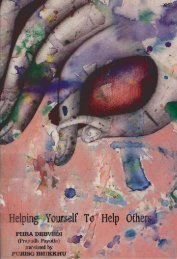The Buddhist Perspective on Cause and Condition
Create successful ePaper yourself
Turn your PDF publications into a flip-book with our unique Google optimized e-Paper software.
<str<strong>on</strong>g>The</str<strong>on</strong>g> <str<strong>on</strong>g>Buddhist</str<strong>on</strong>g> <str<strong>on</strong>g>Perspective</str<strong>on</strong>g> <strong>on</strong><br />
<strong>Cause</strong> <strong>and</strong> C<strong>on</strong>diti<strong>on</strong><br />
Dear Venerables <strong>and</strong> Dharma Friends,<br />
Over 2,500 years ago, Sakyamuni Buddha was<br />
born into this world for the cause <strong>and</strong> c<strong>on</strong>diti<strong>on</strong> of a<br />
major missi<strong>on</strong>. This major missi<strong>on</strong>, this cause <strong>and</strong><br />
c<strong>on</strong>diti<strong>on</strong>, is what we now comm<strong>on</strong>ly refer to as the<br />
“Buddha Dharma,” the Truth realized by the Buddha.<br />
<str<strong>on</strong>g>The</str<strong>on</strong>g> <str<strong>on</strong>g>Buddhist</str<strong>on</strong>g> teachings differ from scholastic<br />
inquiry <strong>and</strong> knowledge. Usual scholastic inquiry focuses<br />
<strong>on</strong> explanati<strong>on</strong> of appearances; it is an interpretati<strong>on</strong><br />
based <strong>on</strong> the name <strong>and</strong> form of phenomena.<br />
In c<strong>on</strong>trast, Buddhism emphasizes the penetrative<br />
underst<strong>and</strong>ing of the nature of phenomena; it is ultimate<br />
<strong>and</strong> complete. For example, let us talk about<br />
my h<strong>and</strong>. Comm<strong>on</strong> knowledge holds that it is a h<strong>and</strong>.<br />
- 1 -
Medical science looks at it as a structure of b<strong>on</strong>es,<br />
muscles, nerves, <strong>and</strong> cells. Literature defines the h<strong>and</strong><br />
in terms of style, gesture, <strong>and</strong> expressi<strong>on</strong>. <str<strong>on</strong>g>The</str<strong>on</strong>g> philosophical<br />
interpretati<strong>on</strong> of the h<strong>and</strong> sees it as the<br />
embodiment of destiny <strong>and</strong> friendship. In physics, the<br />
extensi<strong>on</strong> <strong>and</strong> c<strong>on</strong>tracti<strong>on</strong> of the h<strong>and</strong> is force <strong>and</strong><br />
movement. In summati<strong>on</strong>, the h<strong>and</strong> is regarded as real,<br />
as something that truly exists. In c<strong>on</strong>trast, the <str<strong>on</strong>g>Buddhist</str<strong>on</strong>g><br />
view of my h<strong>and</strong> is like a penetrating X-ray,<br />
which surmises that the h<strong>and</strong> is really <strong>on</strong>ly an illusive<br />
form, unstable in nature, <strong>and</strong> will eventually decay<br />
<strong>and</strong> vanish. It is a phenomen<strong>on</strong> that is ultimately<br />
empty in nature. Let’s say I extend my h<strong>and</strong> <strong>and</strong> make<br />
a grasping moti<strong>on</strong>. Comm<strong>on</strong> knowledge <strong>and</strong> intellect<br />
would say that I have grasped some air <strong>and</strong> dust particles.<br />
It is a movement <strong>and</strong> gesture. From the <str<strong>on</strong>g>Buddhist</str<strong>on</strong>g><br />
point of view, the grasp is “like a dream, illusi<strong>on</strong>,<br />
bubble, or shadow, like the dew or lightning.” It is<br />
<strong>on</strong>ly a phenomen<strong>on</strong> that exists because of the combinati<strong>on</strong><br />
of certain causes <strong>and</strong> c<strong>on</strong>diti<strong>on</strong>s. Thus, we<br />
can see that human perspectives are narrow <strong>and</strong> c<strong>on</strong>fined;<br />
they often hinder us from looking at the world<br />
in the radiance of ultimate wisdom. Worldly happiness<br />
<strong>and</strong> suffering do not have an absolute existence<br />
- 2 -
of their own. <str<strong>on</strong>g>The</str<strong>on</strong>g>y arise <strong>on</strong>ly because of the differentiati<strong>on</strong>s<br />
we make in our percepti<strong>on</strong> <strong>and</strong> cogniti<strong>on</strong>.<br />
When we come to underst<strong>and</strong> <strong>and</strong> accept the <str<strong>on</strong>g>Buddhist</str<strong>on</strong>g><br />
teachings, we need to change our perspectives.<br />
We must go bey<strong>on</strong>d superficial phenomena into the<br />
ultimate reality of “suchness,” illuminate our prajna-wisdom,<br />
<strong>and</strong> sow bodhi seeds. Only then, will the<br />
Dharma water of samadhi flow into the spiritual<br />
fields of our hearts.<br />
<str<strong>on</strong>g>The</str<strong>on</strong>g> scripture tells the following story that will<br />
further develop my explanati<strong>on</strong>. <str<strong>on</strong>g>The</str<strong>on</strong>g>re was <strong>on</strong>ce an<br />
old lady who cried all the time. Her elder daughter<br />
was married to an umbrella merchant while the<br />
younger daughter was the wife of a noodle vendor.<br />
On sunny days, she worried, “Oh no! <str<strong>on</strong>g>The</str<strong>on</strong>g> weather is<br />
so nice <strong>and</strong> sunny. No <strong>on</strong>e is going to buy any umbrellas.<br />
What will happen if the shop has to be<br />
closed?” <str<strong>on</strong>g>The</str<strong>on</strong>g>se worries made her sad. She just could<br />
not help but cry. When it rained, she would cry for the<br />
younger daughter. She thought, “Oh no! My younger<br />
daughter is married to a noodle vendor. You cannot<br />
dry noodles without the sun. Now there will be no<br />
noodles to sell. What should we do?” As a result, the<br />
old lady lived in sorrow everyday. Whether sunny or<br />
- 3 -
ainy, she grieved for <strong>on</strong>e of her daughters. Her<br />
neighbors could not c<strong>on</strong>sole her <strong>and</strong> jokingly called<br />
her “the crying lady.”<br />
One day, she met a m<strong>on</strong>k. He was very curious as<br />
to why she was always crying. She explained the<br />
problem to him. <str<strong>on</strong>g>The</str<strong>on</strong>g> m<strong>on</strong>k smiled kindly <strong>and</strong> said,<br />
“Madam! You d<strong>on</strong>’t have to worry. I will show you<br />
the way to happiness, <strong>and</strong> you will not need to grieve<br />
any more.”<br />
<str<strong>on</strong>g>The</str<strong>on</strong>g> crying lady was very excited. She immediately<br />
asked the m<strong>on</strong>k to show her what to do. <str<strong>on</strong>g>The</str<strong>on</strong>g><br />
master replied, “It is very simple. You just need to<br />
change your perspective. On sunny days, do not think<br />
of your elder daughter not being able to sell umbrellas.<br />
Instead think of the younger daughter who will be<br />
able to dry her noodles. With such good str<strong>on</strong>g<br />
sunlight, she will be able to make plenty of noodles<br />
<strong>and</strong> her business will be very good. When it rains,<br />
think about the elder daughter’s umbrella store. With<br />
the rain, every<strong>on</strong>e must buy umbrellas. She will sell a<br />
lot of umbrellas <strong>and</strong> her store will prosper.”<br />
<str<strong>on</strong>g>The</str<strong>on</strong>g> old lady saw the light. She followed the<br />
m<strong>on</strong>k’s instructi<strong>on</strong>. After a while, she did not cry<br />
anymore; instead, she was smiling everyday. From<br />
- 4 -
that day <strong>on</strong> she was known as “the smiling lady.”<br />
When we have worries <strong>and</strong> problems, if we all<br />
emulate “the crying lady” <strong>and</strong> change our perspectives<br />
a little, we can transform negativity into happiness<br />
<strong>and</strong> fortune. This does not require magical<br />
power. If we can comprehend a minute amount of the<br />
w<strong>on</strong>drous Dharma of Buddhism <strong>and</strong> apply it effectively<br />
during pivotal junctures in our lives, we can<br />
have breakthroughs in our underst<strong>and</strong>ings. We will<br />
then turn foolishness into wisdom, <strong>and</strong> ignorance into<br />
enlightenment.<br />
Any<strong>on</strong>e who has some knowledge regarding<br />
Buddhism knows that Sakyamuni Buddha achieved<br />
enlightenment while gazing at the evening stars under<br />
a bodhi tree <strong>on</strong> a “diam<strong>on</strong>d” thr<strong>on</strong>e. When the bright<br />
shooting star streaked across the sky, what did the<br />
Buddha come to realize? He had seen the ultimate<br />
reality of the universe <strong>and</strong> life.<br />
What then is the Truth realized by the Buddha? It<br />
is the law of cause <strong>and</strong> c<strong>on</strong>diti<strong>on</strong>, the law of dependent<br />
originati<strong>on</strong>.<br />
If we can underst<strong>and</strong> the law of cause <strong>and</strong> c<strong>on</strong>diti<strong>on</strong>,<br />
the law of dependent originati<strong>on</strong>, <strong>and</strong> if we can<br />
live by this truth, we will be just like the Buddha. We<br />
- 5 -
can then ab<strong>and</strong><strong>on</strong> all the pains <strong>and</strong> anxieties that are<br />
associated with this imperfect worldly existence. <str<strong>on</strong>g>The</str<strong>on</strong>g><br />
scripture states, “All phenomena arise out of causes<br />
<strong>and</strong> c<strong>on</strong>diti<strong>on</strong>s; all phenomena cease due to causes<br />
<strong>and</strong> c<strong>on</strong>diti<strong>on</strong>s.” What do we mean by causes <strong>and</strong><br />
c<strong>on</strong>diti<strong>on</strong>s? <strong>Cause</strong>s <strong>and</strong> c<strong>on</strong>diti<strong>on</strong>s are nothing other<br />
than human interacti<strong>on</strong>s <strong>and</strong> relati<strong>on</strong>ships. Relati<strong>on</strong>ships<br />
can be loving <strong>and</strong> respectful, antag<strong>on</strong>istic <strong>and</strong><br />
competitive, or good <strong>and</strong> bad. If we can grasp the law<br />
of cause <strong>and</strong> c<strong>on</strong>diti<strong>on</strong>, we can underst<strong>and</strong> the rise<br />
<strong>and</strong> fall of sentient beings’ welfare, the origin <strong>and</strong><br />
extincti<strong>on</strong> of existence, <strong>and</strong> the reality of the universe<br />
<strong>and</strong> humanity.<br />
<str<strong>on</strong>g>The</str<strong>on</strong>g>re are usually four ways people look at the<br />
ever arising <strong>and</strong> ceasing of causes <strong>and</strong> c<strong>on</strong>diti<strong>on</strong>s:<br />
A. Without <strong>Cause</strong>, Without C<strong>on</strong>diti<strong>on</strong><br />
Comm<strong>on</strong>ly held beliefs about life include predeterminati<strong>on</strong>,<br />
r<strong>and</strong>om chance, <strong>and</strong> divine design.<br />
<str<strong>on</strong>g>The</str<strong>on</strong>g>se perspectives do not look at life from the<br />
st<strong>and</strong>point of cause <strong>and</strong> c<strong>on</strong>diti<strong>on</strong>. For example,<br />
rocks do not normally produce oil, but let us suppose<br />
that some<strong>on</strong>e accidentally mines some fossil oil from<br />
rocks. Instead of analyzing the fossil oil <strong>and</strong> finding<br />
the cause of its formati<strong>on</strong>, the pers<strong>on</strong> just assumes it<br />
- 6 -
to be a r<strong>and</strong>om occurrence. When a child overeats <strong>and</strong><br />
chokes to death, instead of thinking they should have<br />
prevented the child from overeating, the family<br />
members lament it as destiny. An unsuccessful robbery<br />
attempt turns into a murder; the family of the<br />
victim just blames it <strong>on</strong> predeterminati<strong>on</strong>. <str<strong>on</strong>g>The</str<strong>on</strong>g> most<br />
pitiful people are those who lay all resp<strong>on</strong>sibility at<br />
the doorsteps of the gods. <str<strong>on</strong>g>The</str<strong>on</strong>g>y deny the value of<br />
choice, the meaning of effort, <strong>and</strong> the importance of<br />
self-determinati<strong>on</strong>. This total reliance <strong>on</strong> destiny<br />
negates the significance of self-help. It is an err<strong>on</strong>eous<br />
<strong>and</strong> <strong>on</strong>e-sided view. It is not in accordance with<br />
the law of cause <strong>and</strong> c<strong>on</strong>diti<strong>on</strong>.<br />
B. Without <strong>Cause</strong>, but With C<strong>on</strong>diti<strong>on</strong><br />
Many people do not believe in past causes, c<strong>on</strong>diti<strong>on</strong>s,<br />
<strong>and</strong> effects. <str<strong>on</strong>g>The</str<strong>on</strong>g>y believe that life depends <strong>on</strong><br />
present c<strong>on</strong>diti<strong>on</strong>s <strong>and</strong> current opportunities. <str<strong>on</strong>g>The</str<strong>on</strong>g>y<br />
look at mishaps as the lack of proper c<strong>on</strong>diti<strong>on</strong>s, or as<br />
unc<strong>on</strong>trollable predicaments, such as, “Everything is<br />
in place except for the east wind.” 1 Some siblings in a<br />
family persevere <strong>and</strong> become successful. Others just<br />
1 This is a saying about how the famous wise minister <strong>and</strong><br />
military strategist Zhuge K<strong>on</strong>gming was set to win a battle<br />
except for the last crucial c<strong>on</strong>diti<strong>on</strong>, the east wind.<br />
- 7 -
give up <strong>and</strong> fail. <str<strong>on</strong>g>The</str<strong>on</strong>g>y blame it all <strong>on</strong> the lack of opportunities<br />
or ill fate <strong>and</strong> overlook their differences in<br />
educati<strong>on</strong> <strong>and</strong> character. Students in the same class<br />
finish with different grades. <str<strong>on</strong>g>The</str<strong>on</strong>g>y attribute the differences<br />
<strong>on</strong>ly to the apparent c<strong>on</strong>diti<strong>on</strong> of how much<br />
they apply themselves <strong>and</strong> overlook the underlying<br />
causes of the variati<strong>on</strong>s in aptitude <strong>and</strong> intellect. This<br />
is <strong>on</strong>ly a partial <strong>and</strong> biased underst<strong>and</strong>ing of cause<br />
<strong>and</strong> c<strong>on</strong>diti<strong>on</strong>.<br />
C. With <strong>Cause</strong>, but Without C<strong>on</strong>diti<strong>on</strong><br />
Many people look at cause <strong>and</strong> c<strong>on</strong>diti<strong>on</strong> separately.<br />
<str<strong>on</strong>g>The</str<strong>on</strong>g>y attribute their circumstances to causes<br />
but not to c<strong>on</strong>diti<strong>on</strong>s. <str<strong>on</strong>g>The</str<strong>on</strong>g>y overlook the w<strong>on</strong>drous<br />
<strong>and</strong> dynamic interplay of cause <strong>and</strong> c<strong>on</strong>diti<strong>on</strong>. <str<strong>on</strong>g>The</str<strong>on</strong>g>re<br />
are many examples of talented people who fail to live<br />
up to their potential, precisely due to the lack of<br />
proper c<strong>on</strong>diti<strong>on</strong>s in which to exert themselves. When<br />
first entering the work force, they apply for jobs that<br />
call for experienced workers. Finally when they are<br />
mature, they <strong>on</strong>ly find openings for new graduates.<br />
Such situati<strong>on</strong>s happen all the time. Some people<br />
view cause <strong>and</strong> c<strong>on</strong>diti<strong>on</strong> as separate <strong>and</strong> independent.<br />
Sometimes they believe in cause but not in c<strong>on</strong>diti<strong>on</strong>.<br />
Other times, they <strong>on</strong>ly accept the existence of c<strong>on</strong>di-<br />
- 8 -
ti<strong>on</strong>. <str<strong>on</strong>g>The</str<strong>on</strong>g>se people fail to realize that cause <strong>and</strong> c<strong>on</strong>diti<strong>on</strong><br />
are not static, but are forever changing in the<br />
space-time c<strong>on</strong>tinuum, never st<strong>and</strong>ing still to wait for<br />
any<strong>on</strong>e. <str<strong>on</strong>g>The</str<strong>on</strong>g>re is an old saying which illustrates this<br />
point, “Good begets blessings; evil will be punished.<br />
It is not that there are no effects due to our acts; it is<br />
just a matter of time.”<br />
<str<strong>on</strong>g>The</str<strong>on</strong>g> three views described above are biased <strong>and</strong><br />
do not reflect the correct interpretati<strong>on</strong> of the <str<strong>on</strong>g>Buddhist</str<strong>on</strong>g><br />
view <strong>on</strong> cause <strong>and</strong> c<strong>on</strong>diti<strong>on</strong>. In Buddhism, we<br />
believe that cause, c<strong>on</strong>diti<strong>on</strong>, reward, <strong>and</strong> punishment<br />
are all intertwined, <strong>on</strong>e giving rise to the other. All<br />
circumstances happen because of “the existence of<br />
causes <strong>and</strong> c<strong>on</strong>diti<strong>on</strong>s.”<br />
D. With <strong>Cause</strong> <strong>and</strong> With C<strong>on</strong>diti<strong>on</strong><br />
In Buddhism, the comm<strong>on</strong> thread for all Dharma<br />
is the law of cause <strong>and</strong> c<strong>on</strong>diti<strong>on</strong>, regardless of<br />
whether it is the school of Mahayana or <str<strong>on</strong>g>The</str<strong>on</strong>g>ravada,<br />
whether it is viewed from the angle of principles or<br />
phenomena, or whether the perspective is worldly or<br />
transcendental. All phenomenal existences are products<br />
of the proper mix of causes <strong>and</strong> c<strong>on</strong>diti<strong>on</strong>s. It is<br />
written in the Surangama Sutra, “All holy teachings,<br />
from elementary to profound, cannot depart from the<br />
- 9 -
law of cause <strong>and</strong> c<strong>on</strong>diti<strong>on</strong>.” It is like building a<br />
house. We need bricks, wood, cement, <strong>and</strong> other<br />
materials. <str<strong>on</strong>g>The</str<strong>on</strong>g> c<strong>on</strong>structi<strong>on</strong> can <strong>on</strong>ly be completed<br />
when <strong>on</strong>e has all the essential materials <strong>and</strong> all prerequisites<br />
are met. For example, if we want to throw a<br />
party, there are many c<strong>on</strong>diti<strong>on</strong>s to c<strong>on</strong>sider. Do we<br />
know our guests well? Can they come? Can we find<br />
the appropriate accommodati<strong>on</strong>s? Only when all the<br />
proper causes <strong>and</strong> c<strong>on</strong>diti<strong>on</strong>s are present can the party<br />
be a success. If not, the party will be a flop.<br />
Once, a rich man threw a party. When half of the<br />
guests had already arrived, the chef asked if he could<br />
start to serve. <str<strong>on</strong>g>The</str<strong>on</strong>g> man told him to wait a little bit<br />
l<strong>on</strong>ger. After waiting a few hours, many important<br />
guests still had not arrived. Impatient <strong>and</strong> irritated, he<br />
complained carelessly, “Oh! It is not easy to throw a<br />
party. Those who should have come have not; those<br />
who should not have come are all here.”<br />
His seated guests were shocked. <str<strong>on</strong>g>The</str<strong>on</strong>g>y thought to<br />
themselves, “I guess I am not really invited. If I am<br />
not welcome, I may as well go home.” One by <strong>on</strong>e,<br />
the guests quietly slipped away. Seeing the party was<br />
dying, the rich man made another careless remark,<br />
“Oh! It is not easy to throw a party. Those who should<br />
- 10 -
leave have not. Those who should not have left are all<br />
g<strong>on</strong>e.”<br />
After hearing these thoughtless words, every<br />
guest was upset. <str<strong>on</strong>g>The</str<strong>on</strong>g>y all stood up <strong>and</strong> left the party<br />
in a huff.<br />
With the appropriate causes <strong>and</strong> c<strong>on</strong>diti<strong>on</strong>s, all<br />
endeavors will become successful. If we destroy our<br />
own causes <strong>and</strong> c<strong>on</strong>diti<strong>on</strong>s or if we cannot seize the<br />
moment available to us due to our own causes <strong>and</strong><br />
c<strong>on</strong>diti<strong>on</strong>s, success will be hard to come by. Allow<br />
me to build some good causes <strong>and</strong> c<strong>on</strong>diti<strong>on</strong>s with<br />
you all today, <strong>and</strong> let me explain the <str<strong>on</strong>g>Buddhist</str<strong>on</strong>g> view<br />
<strong>on</strong> cause <strong>and</strong> c<strong>on</strong>diti<strong>on</strong> in the following four points.<br />
I. <strong>Cause</strong> <strong>and</strong> C<strong>on</strong>diti<strong>on</strong> <strong>and</strong> Human Relati<strong>on</strong>ships<br />
Today, it is popular to talk about “interpers<strong>on</strong>al<br />
relati<strong>on</strong>ships.” With good interpers<strong>on</strong>al relati<strong>on</strong>ships,<br />
everything goes smoothly; otherwise, obstacles <strong>and</strong><br />
problems abound. Events are the products of combinati<strong>on</strong>s<br />
of forces with “the major force called the<br />
cause; the lesser forces called c<strong>on</strong>diti<strong>on</strong>s.” Interpers<strong>on</strong>al<br />
relati<strong>on</strong>ships are a form of cause <strong>and</strong> c<strong>on</strong>diti<strong>on</strong>.<br />
- 11 -
If we want to have a successful business, we must<br />
acquire sufficient capital, research the market, <strong>and</strong><br />
then establish investments. If we do our homework,<br />
our businesses will thrive; otherwise, they will fail.<br />
Planning <strong>and</strong> setting up suitable business arrangements<br />
are the causes <strong>and</strong> c<strong>on</strong>diti<strong>on</strong>s of business.<br />
We must learn to be humble <strong>and</strong> be appreciative<br />
of the relati<strong>on</strong>ships we have with others. Arrogance<br />
shuts off even the best of causes <strong>and</strong> c<strong>on</strong>diti<strong>on</strong>s. One<br />
such example is the meeting between Bodhidharma<br />
<strong>and</strong> Emperor Wu of the Liang Dynasty.<br />
Master Bodhidharma, the First Patriarch of Chan<br />
School, arrived from India to Guangzhou, China by<br />
sea at the time of the Dat<strong>on</strong>g era of Emperor Wu<br />
during the Liang Dynasty. <str<strong>on</strong>g>The</str<strong>on</strong>g> Emperor quickly sent<br />
envoys to accompany Bodhidharma to the capital.<br />
Emperor Wu, who wished to show off his past accomplishments,<br />
proudly asked Bodhidharma, “I have<br />
built numerous temples, published many scriptures,<br />
<strong>and</strong> supported the sangha. How much merit do you<br />
think I have accumulated?”<br />
Dampening the Emperor’s enthusiasm, Bodhidharma<br />
replied coolly, “N<strong>on</strong>e at all.”<br />
<str<strong>on</strong>g>The</str<strong>on</strong>g> Emperor was very upset. He asked further,<br />
- 12 -
“What do you mean? I have d<strong>on</strong>e so many good <strong>and</strong><br />
outst<strong>and</strong>ing acts of benevolence.”<br />
Bodhidharma replied, “Your Majesty! <str<strong>on</strong>g>The</str<strong>on</strong>g>y are<br />
imperfect causes <strong>and</strong> will <strong>on</strong>ly bring you minor rewards<br />
in the human <strong>and</strong> celestial realms. <str<strong>on</strong>g>The</str<strong>on</strong>g>y are as<br />
illusive as shadows. <str<strong>on</strong>g>The</str<strong>on</strong>g>y are <strong>on</strong>ly empty phenomena.”<br />
“Well! What then are real merits?”<br />
“Do not become attached to the name <strong>and</strong> form of<br />
merits,” smiled Bodhidharma. “Sanctify your<br />
thoughts. Realize the ultimate nature of emptiness.<br />
Abstain from greed <strong>and</strong> do not pursue worldly rewards.”<br />
<str<strong>on</strong>g>The</str<strong>on</strong>g> Emperor could not underst<strong>and</strong> these profound<br />
words. To show off his wisdom as the emperor<br />
of his people, he asked in his usual arrogant t<strong>on</strong>e,<br />
“Between heaven <strong>and</strong> earth, who is the holiest?”<br />
Bodhidharma saw through the vanity of the<br />
Emperor. Not letting up, he replied, “Between heaven<br />
<strong>and</strong> earth, there are neither the holy nor the ordinary.”<br />
Emperor Wu asked loudly, “Do you know who I<br />
am?”<br />
Bodhidharma smiled lightly, shook his head <strong>and</strong><br />
said, “I do not know.”<br />
- 13 -
<str<strong>on</strong>g>The</str<strong>on</strong>g> Emperor always c<strong>on</strong>sidered himself a great<br />
benefactor of Buddhism. He was c<strong>on</strong>ceited <strong>and</strong> not<br />
truly sincere about learning the Truth. How could he<br />
possibly take such slighting by Bodhidharma? He<br />
immediately flaunted his powers as the emperor <strong>and</strong><br />
rudely sent Bodhidharma away. In so doing, he had<br />
lost the cause <strong>and</strong> c<strong>on</strong>diti<strong>on</strong> to learn Chan from Bodhidharma;<br />
he had dismissed the excellent opportunity<br />
for the metamorphosis of Chinese Buddhism.<br />
Although he eventually regretted his behavior <strong>and</strong><br />
tried to send for Bodhidharma again, it was already<br />
too late.<br />
As the Emperor was egotistic <strong>and</strong> hungry for<br />
fame, he became caught up in the name of merits <strong>and</strong><br />
swayed away from the Middle Path. He could not<br />
realize the ultimate truth that is “bey<strong>on</strong>d true or false,<br />
bey<strong>on</strong>d good or bad.” Since the cause was improper<br />
<strong>and</strong> c<strong>on</strong>diti<strong>on</strong>s were poor, it was no w<strong>on</strong>der that the<br />
encounter went nowhere.<br />
It is written in the Avatamsaka Sutra, “All the<br />
water in the oceans can be c<strong>on</strong>sumed, all momentary<br />
thoughts as innumerable as dust particles can be<br />
counted, all the space can be measured, <strong>and</strong> all the<br />
winds can be stopped; yet, the realm of the Buddha<br />
- 14 -
can never be fully described.” So, for your elucidati<strong>on</strong>,<br />
I will describe an episode involving the Sixth<br />
Patriarch, Huineng, that can further illustrate the law<br />
of cause <strong>and</strong> c<strong>on</strong>diti<strong>on</strong>.<br />
When Huineng was young, he traveled thirty<br />
days from Guangd<strong>on</strong>g to Hube to learn the Dharma<br />
from the Fifth Patriarch. When they first met, the<br />
Fifth Patriarch immediately knew that Huineng had<br />
great potential <strong>and</strong> that the right causes <strong>and</strong> c<strong>on</strong>diti<strong>on</strong>s<br />
were ripening. He asked, “Where are you from?<br />
And what are you seeking?”<br />
“I have come from very far away, from Lingnan.<br />
My <strong>on</strong>ly goal is to be a patriarch <strong>and</strong> become a<br />
Buddha.”<br />
Hearing such a reply, the Fifth Patriarch was<br />
impressed. He wanted to test if Huineng had cultivated<br />
the right c<strong>on</strong>diti<strong>on</strong>s <strong>and</strong> asked him pointedly,<br />
“You are <strong>on</strong>ly a barbarian from the South. How dare<br />
you wish to become a Buddha?”<br />
Huineng replied calmly <strong>and</strong> c<strong>on</strong>fidently, “People<br />
may be from the south or north, but the Buddha Nature<br />
is n<strong>on</strong>-regi<strong>on</strong>al. When the right cause <strong>and</strong> c<strong>on</strong>diti<strong>on</strong><br />
exists, any<strong>on</strong>e can become a Buddha. Why not<br />
me?”<br />
- 15 -
Huineng struck a chord with the Fifth Patriarch.<br />
He reflected <strong>and</strong> replied, “Okay! You are allowed to<br />
stay here <strong>and</strong> work. Report to the threshing mill.”<br />
Everyday for the next eight m<strong>on</strong>ths, Huineng<br />
used a huge axe to collect firewood. Everyday, he<br />
wore st<strong>on</strong>e weights around his waist to act as ballasts<br />
in helping him thresh grains. Not <strong>on</strong>ce did the Fifth<br />
Patriarch visit him; not <strong>on</strong>ce did the Fifth Patriarch<br />
teach him <strong>on</strong>e word. Huineng did not complain or get<br />
upset. It was late <strong>on</strong>e night when the Fifth Patriarch<br />
finally h<strong>and</strong>ed Huineng his robe <strong>and</strong> bowl, making<br />
him the Sixth Patriarch. <str<strong>on</strong>g>The</str<strong>on</strong>g> Fifth Patriarch explained<br />
himself with this verse:<br />
Those with sentience come to sow<br />
In fields of causati<strong>on</strong>, fruits will grow.<br />
Ultimately without sentience,<br />
Having nothing to sow,<br />
Without nature, there is nothing to grow.<br />
What the Fifth Patriarch was saying through this<br />
verse is this: When you first arrived from the distant<br />
l<strong>and</strong> of Lingnan to learn the Truth from me, the cause<br />
was ripe <strong>and</strong> you were sincere. <str<strong>on</strong>g>The</str<strong>on</strong>g> envir<strong>on</strong>ment <strong>and</strong><br />
c<strong>on</strong>diti<strong>on</strong>s, however, were inadequate. I first needed<br />
- 16 -
you to polish <strong>and</strong> cultivate yourself for a period of<br />
time to the point “ultimately without sentience, having<br />
nothing to sow; without nature, there is nothing to<br />
grow.” Only when the right causes <strong>and</strong> c<strong>on</strong>diti<strong>on</strong>s<br />
were met, would I then transmit the teachings.<br />
From this story, we can see how cause <strong>and</strong> c<strong>on</strong>diti<strong>on</strong><br />
can greatly influence how people interact with<br />
<strong>on</strong>e another. Without the appropriate cause <strong>and</strong> c<strong>on</strong>diti<strong>on</strong>,<br />
human relati<strong>on</strong>ships will be imperfect <strong>and</strong><br />
regretful. Events must await the maturity of cause <strong>and</strong><br />
c<strong>on</strong>diti<strong>on</strong>. It is like planting flowers. Some seeds<br />
planted in spring may blossom in the autumn. Others<br />
may take a year to bloom. Some varieties may take<br />
even a few years to flower <strong>and</strong> bear fruit. Han Yu, a<br />
famous Chinese scholar of the Tang Dynasty, was<br />
demoted <strong>and</strong> transferred to the remote area of<br />
Chaozhou. As this area was far removed <strong>and</strong> culturally<br />
backward, there were few learned scholars with<br />
whom he could c<strong>on</strong>verse. When he heard Chan<br />
Master Dadian was preaching in the area, he immediately<br />
went over for a visit. It just happened that the<br />
Chan master was meditating, so Han Yu decided to<br />
wait outside. After a l<strong>on</strong>g wait, as the master was still<br />
in meditati<strong>on</strong>, Han Yu became restless so he stood up<br />
- 17 -
<strong>and</strong> was about to leave. <str<strong>on</strong>g>The</str<strong>on</strong>g> master’s attendant suddenly<br />
said, “First, influence through meditative c<strong>on</strong>centrati<strong>on</strong>,<br />
then eradicate [arrogance] with wisdom.”<br />
<str<strong>on</strong>g>The</str<strong>on</strong>g> words res<strong>on</strong>ated like str<strong>on</strong>g spring thunder <strong>and</strong><br />
awakened Han Yu. Because his c<strong>on</strong>diti<strong>on</strong>s of timing<br />
<strong>and</strong> opportunity were just right at that moment, Han<br />
Yu was able <strong>and</strong> ready to recognize the teaching <strong>and</strong><br />
learn the way of emancipati<strong>on</strong> from the attendant.<br />
Several years ago, a female university graduate<br />
left Taiwan with high hopes <strong>and</strong> traveled halfway<br />
across the world to study for her doctorate degree in<br />
the United States. After a period of two years in the<br />
States, she felt that life was empty <strong>and</strong> aimless so she<br />
packed her bags <strong>and</strong> returned to Taiwan. From Taipei,<br />
she took a two-hour train ride to Hsinchu <strong>and</strong> became<br />
a <str<strong>on</strong>g>Buddhist</str<strong>on</strong>g> nun. This news story received a lot of<br />
attenti<strong>on</strong> when reported by the media. <str<strong>on</strong>g>The</str<strong>on</strong>g> famous<br />
Professor Liang Shiqiu sighed, “If what she had<br />
wanted originally was to renounce <strong>and</strong> become a nun,<br />
all she had to do was take a two-hour train ride from<br />
Taipei to Hsinchu. <str<strong>on</strong>g>The</str<strong>on</strong>g>re was no need to fly to<br />
America. Why spend all that time struggling <strong>and</strong> then<br />
choose to renounce?”<br />
<str<strong>on</strong>g>The</str<strong>on</strong>g> causes <strong>and</strong> c<strong>on</strong>diti<strong>on</strong>s of human affairs are<br />
- 18 -
ather similar to the unfolding circumstances relating<br />
to this woman’s renunciati<strong>on</strong> of home life to become<br />
a nun. Events may come <strong>and</strong> go, people may meet<br />
<strong>and</strong> separate; however r<strong>and</strong>om it may appear, there is<br />
meaning in all turns of events. <str<strong>on</strong>g>The</str<strong>on</strong>g> following Chinese<br />
saying captures this point well, “Without a<br />
b<strong>on</strong>e-chilling freeze, how could plum blossoms have<br />
such great fragrance?” Everything must first have the<br />
right causes <strong>and</strong> proper c<strong>on</strong>diti<strong>on</strong>s before results are<br />
produced <strong>and</strong> other favorable c<strong>on</strong>diti<strong>on</strong>s are generated.<br />
<str<strong>on</strong>g>The</str<strong>on</strong>g>re is the story of Chan Master Shitou Xiqian<br />
<strong>and</strong> his master, Qingyuan Xingsi. When they first met,<br />
Qingyuan asked Shitou if he was a student of the<br />
Sixth Patriarch, <strong>and</strong> if he still had any questi<strong>on</strong>s,<br />
“What did you take with you when you first went to<br />
Caoxi?”<br />
“My nature was complete,” Shitou smiled. “I was<br />
not missing anything prior to studying with the Sixth<br />
Patriarch in Caoxi.”<br />
“If everything was perfect, why then did you<br />
bother to go to study in Caoxi?”<br />
Shitou Xiqian replied definitively, “If I had not<br />
g<strong>on</strong>e, how would I have known that I was not lacking<br />
in anything? How could I have seen through my true<br />
- 19 -
<strong>and</strong> free nature?”<br />
All causes <strong>and</strong> c<strong>on</strong>diti<strong>on</strong>s are within our true<br />
nature. We must realize the Truth in daily living. <str<strong>on</strong>g>The</str<strong>on</strong>g><br />
c<strong>on</strong>tinual flow of pure refreshing water is a form of<br />
cause <strong>and</strong> c<strong>on</strong>diti<strong>on</strong>. <str<strong>on</strong>g>The</str<strong>on</strong>g> blossoming of beautiful<br />
flowers everywhere is another form of cause <strong>and</strong><br />
c<strong>on</strong>diti<strong>on</strong>. Parents who raise us are our causes <strong>and</strong><br />
c<strong>on</strong>diti<strong>on</strong>s in family relati<strong>on</strong>ships. Teachers who<br />
educate us are our causes <strong>and</strong> c<strong>on</strong>diti<strong>on</strong>s in the pursuit<br />
of knowledge. Farmers, workers, <strong>and</strong> merchants<br />
who supply our daily needs are the causes <strong>and</strong> c<strong>on</strong>diti<strong>on</strong>s<br />
of living in this society. Drivers who transport<br />
us here <strong>and</strong> there are the causes <strong>and</strong> c<strong>on</strong>diti<strong>on</strong>s of<br />
traveling. Turning <strong>on</strong> the televisi<strong>on</strong> <strong>and</strong> watching<br />
televisi<strong>on</strong> programs are the causes <strong>and</strong> c<strong>on</strong>diti<strong>on</strong>s of<br />
entertainment. It is with these w<strong>on</strong>drous combinati<strong>on</strong>s<br />
of causes <strong>and</strong> c<strong>on</strong>diti<strong>on</strong>s that we can live happily<br />
<strong>and</strong> freely.<br />
Regarding the causes <strong>and</strong> c<strong>on</strong>diti<strong>on</strong>s of human<br />
relati<strong>on</strong>ships, I will cite a verse that can usually be<br />
found in temples next to statues of Maitreya Bodhisattva:<br />
Before our eyes are people<br />
c<strong>on</strong>nected to us through c<strong>on</strong>diti<strong>on</strong>s;<br />
- 20 -
As we meet <strong>and</strong> befriend each other,<br />
How can we not be filled with joy?<br />
<str<strong>on</strong>g>The</str<strong>on</strong>g> world is full<br />
of difficult <strong>and</strong> unbearable problems;<br />
As we end up reaping what we sow,<br />
Why not open our minds<br />
<strong>and</strong> be magnanimous?<br />
II. How Do We Know <strong>Cause</strong> <strong>and</strong> C<strong>on</strong>diti<strong>on</strong><br />
Exist?<br />
How can we be certain that cause <strong>and</strong> c<strong>on</strong>diti<strong>on</strong><br />
really exist? How can it be discovered <strong>and</strong> harvested?<br />
For example, suppose a machine in a factory suddenly<br />
stops functi<strong>on</strong>ing. <str<strong>on</strong>g>The</str<strong>on</strong>g> technician opens up the<br />
machine <strong>and</strong> discovers a small screw is broken. This<br />
small screw is the cause. When cause <strong>and</strong> c<strong>on</strong>diti<strong>on</strong><br />
are not fully satisfied, the machine will not functi<strong>on</strong>.<br />
When we build a house, if a supporting beam is<br />
missing, the roof will collapse. When any ingredient<br />
of cause or c<strong>on</strong>diti<strong>on</strong> is missing, it can have a great<br />
impact <strong>on</strong> the circumstances of our lives.<br />
Buddhism teaches that our bodies are made up of<br />
the combinati<strong>on</strong> of the four great elements of earth,<br />
water, fire, <strong>and</strong> wind. <str<strong>on</strong>g>The</str<strong>on</strong>g>se four great elements are<br />
- 21 -
the causes. We fall ill when the four elements are not<br />
harm<strong>on</strong>ized. Why does a flower fail to blossom? Why<br />
is a harvest not abundant? It could be a lack of proper<br />
c<strong>on</strong>diti<strong>on</strong>s, such as inadequate irrigati<strong>on</strong> or fertilizer.<br />
Even the space shuttle can be delayed by a simple<br />
computer problem. With the slightest offset in cause<br />
<strong>and</strong> c<strong>on</strong>diti<strong>on</strong>, the resulting circumstance will be<br />
totally different.<br />
No matter what problems or difficulties we face,<br />
we must first reflect. We should examine the situati<strong>on</strong><br />
closely for any missing causes <strong>and</strong> c<strong>on</strong>diti<strong>on</strong>s. We<br />
should not simply blame the gods or other people, or<br />
else we are creating further troubles for ourselves.<br />
<str<strong>on</strong>g>The</str<strong>on</strong>g>re are many situati<strong>on</strong>s in which a couple falls in<br />
love, <strong>on</strong>ly to find that the families oppose the marriage,<br />
criticizing the other party as unsuitable, poor,<br />
etc. When these c<strong>on</strong>diti<strong>on</strong>s, or sec<strong>on</strong>dary causes, are<br />
absent, the marriage will not work. Other couples fall<br />
in love at first sight <strong>and</strong> get married with lightning<br />
speed. <str<strong>on</strong>g>The</str<strong>on</strong>g> rapid development of events is even bey<strong>on</strong>d<br />
their comprehensi<strong>on</strong>. <str<strong>on</strong>g>The</str<strong>on</strong>g> man may reas<strong>on</strong> that<br />
it is a case of “Beauty is in the eye of the beholder.”<br />
<str<strong>on</strong>g>The</str<strong>on</strong>g> woman may attribute it to the fact that “With the<br />
right c<strong>on</strong>diti<strong>on</strong>s, people come to meet from thous<strong>and</strong>s<br />
- 22 -
of miles away.” This is what we call ripened c<strong>on</strong>diti<strong>on</strong>s.<br />
I will relate another story to illustrate the existence<br />
of cause <strong>and</strong> c<strong>on</strong>diti<strong>on</strong>. Once, King Milinda<br />
asked Bhiksu Nagasena, “Are your eyes the real<br />
you?”<br />
Bhiksu Nagasena replied, “No!”<br />
King Milinda further inquired, “What about the<br />
ears?”<br />
“No!”<br />
“Does the nose represent you?”<br />
“No!”<br />
“Does the t<strong>on</strong>gue represent you?”<br />
“No!”<br />
“<str<strong>on</strong>g>The</str<strong>on</strong>g>n, does it mean that your body is the real<br />
you?”<br />
“No, the existence of the body is <strong>on</strong>ly an illusory<br />
combinati<strong>on</strong>.”<br />
“<str<strong>on</strong>g>The</str<strong>on</strong>g> mind must be the real you then.”<br />
“It is not either.”<br />
King Milinda was annoyed <strong>and</strong> asked further<br />
“Well, if the eyes, ears, nose, t<strong>on</strong>gue, body, <strong>and</strong><br />
thoughts are not you, then tell me, where is your true<br />
self'?”<br />
- 23 -
Bhiksu Nagasena grinned <strong>and</strong> replied with a<br />
questi<strong>on</strong>, “Does the window represent the house?”<br />
<str<strong>on</strong>g>The</str<strong>on</strong>g> King was taken by surprise <strong>and</strong> struggled for<br />
an answer, “No!”<br />
“How about the door?”<br />
“No!”<br />
“Does the bricks <strong>and</strong> tiles represent the house?”<br />
“No!”<br />
“<str<strong>on</strong>g>The</str<strong>on</strong>g>n, what about the furniture <strong>and</strong> pillars?”<br />
“No, of course not.”<br />
Bhiksu Nagasena smiled <strong>and</strong> asked, “If the<br />
window, door, bricks, tiles, furniture, <strong>and</strong> pillars do<br />
not represent the house, then where is the real<br />
house?”<br />
King Milinda finally understood that causes,<br />
c<strong>on</strong>diti<strong>on</strong>s, <strong>and</strong> effects cannot be separated nor understood<br />
through a biased <strong>and</strong> partial view. A house<br />
can <strong>on</strong>ly be built with the fulfillment of many c<strong>on</strong>diti<strong>on</strong>s.<br />
Likewise, human existence also needs the satisfacti<strong>on</strong><br />
of many c<strong>on</strong>diti<strong>on</strong>s. If we know the law of<br />
cause <strong>and</strong> c<strong>on</strong>diti<strong>on</strong>, believe in its existence, plant<br />
good causes everywhere, <strong>and</strong> cultivate advantageous<br />
c<strong>on</strong>diti<strong>on</strong>s all the time, our lives will be smooth paths,<br />
full of success. To c<strong>on</strong>clude, I will give you this verse<br />
- 24 -
to p<strong>on</strong>der:<br />
If <strong>on</strong>e underst<strong>and</strong>s<br />
<str<strong>on</strong>g>The</str<strong>on</strong>g> law of cause <strong>and</strong> c<strong>on</strong>diti<strong>on</strong>,<br />
One can find spring<br />
In the midst of autumn frost <strong>and</strong> winter snow.<br />
III. <str<strong>on</strong>g>The</str<strong>on</strong>g> Different Levels of <strong>Cause</strong> <strong>and</strong><br />
C<strong>on</strong>diti<strong>on</strong><br />
How many varieties of cause <strong>and</strong> c<strong>on</strong>diti<strong>on</strong> are<br />
there? We can examine this from four different perspectives:<br />
A. Having or Not Having<br />
<strong>Cause</strong> <strong>and</strong> c<strong>on</strong>diti<strong>on</strong> is not a matter of knowledge.<br />
It cannot be learned by research or via debate. It must<br />
be experienced through the heart <strong>and</strong> mind amidst<br />
daily living. If we come to underst<strong>and</strong> cause <strong>and</strong><br />
c<strong>on</strong>diti<strong>on</strong> from real practice <strong>and</strong> experience, then this<br />
is “having” the true underst<strong>and</strong>ing of cause <strong>and</strong> c<strong>on</strong>diti<strong>on</strong>.<br />
Under the law of cause <strong>and</strong> c<strong>on</strong>diti<strong>on</strong>, our<br />
natures are all equal. <str<strong>on</strong>g>The</str<strong>on</strong>g> universe is us <strong>and</strong> we are<br />
the universe. If we comprehend the law of cause <strong>and</strong><br />
c<strong>on</strong>diti<strong>on</strong> superficially through intellectual speculati<strong>on</strong><br />
or as mere word expressi<strong>on</strong>s, then this is “not<br />
having” the true underst<strong>and</strong>ing of cause <strong>and</strong> c<strong>on</strong>di-<br />
- 25 -
ti<strong>on</strong>. <str<strong>on</strong>g>The</str<strong>on</strong>g> result will be as futile as looking for fish <strong>on</strong><br />
trees.<br />
B. Wholesome or Unwholesome<br />
<strong>Cause</strong>s <strong>and</strong> c<strong>on</strong>diti<strong>on</strong>s can be good or evil.<br />
Wholesome causes <strong>and</strong> c<strong>on</strong>diti<strong>on</strong>s are good. Unwholesome<br />
causes <strong>and</strong> c<strong>on</strong>diti<strong>on</strong>s are evil. Let us<br />
suppose a pers<strong>on</strong> lives to be a hundred years old. If<br />
he/she does not underst<strong>and</strong> the cause of arising <strong>and</strong><br />
ceasing—the ultimate reas<strong>on</strong> for existence—<strong>and</strong> <strong>on</strong>ly<br />
comprehends cause <strong>and</strong> c<strong>on</strong>diti<strong>on</strong> superficially,<br />
he/she will be easily enslaved by changing envir<strong>on</strong>ments<br />
<strong>and</strong> be trapped in dark <strong>and</strong> evil causes <strong>and</strong><br />
c<strong>on</strong>diti<strong>on</strong>s without the chance for liberati<strong>on</strong>. On the<br />
other h<strong>and</strong>, if a pers<strong>on</strong> has a firm belief <strong>and</strong> correct<br />
underst<strong>and</strong>ing, then all resulting causes <strong>and</strong> c<strong>on</strong>diti<strong>on</strong>s<br />
will be bright <strong>and</strong> virtuous.<br />
C. Internal or External<br />
<strong>Cause</strong>s <strong>and</strong> c<strong>on</strong>diti<strong>on</strong>s can be internal or external.<br />
External causes <strong>and</strong> c<strong>on</strong>diti<strong>on</strong>s are the comm<strong>on</strong>ly<br />
noticed envir<strong>on</strong>mental factors. Internal causes <strong>and</strong><br />
c<strong>on</strong>diti<strong>on</strong>s are more related to intrinsic value. It is like<br />
farming a field. <str<strong>on</strong>g>The</str<strong>on</strong>g> external factors may be the same,<br />
but the harvest from different seeds is not. Seeds, in<br />
this instance, have different causes <strong>and</strong> c<strong>on</strong>diti<strong>on</strong>s of<br />
- 26 -
value. For example, the siblings of the same parents<br />
have different temperaments. <str<strong>on</strong>g>The</str<strong>on</strong>g> students of the<br />
same teacher have varying abilities. External causes<br />
<strong>and</strong> c<strong>on</strong>diti<strong>on</strong>s such as parents <strong>and</strong> teachers may be<br />
the same, but the internal causes <strong>and</strong> c<strong>on</strong>diti<strong>on</strong>s of<br />
value such as talent <strong>and</strong> aptitude are very much dissimilar.<br />
<str<strong>on</strong>g>The</str<strong>on</strong>g>refore, we say that cause <strong>and</strong> c<strong>on</strong>diti<strong>on</strong><br />
may be external <strong>and</strong> internal. Although external<br />
c<strong>on</strong>diti<strong>on</strong>s may be complete, if internal causes are<br />
inadequate, the resulting effects will leave much to be<br />
desired.<br />
D. Correct or Err<strong>on</strong>eous<br />
<strong>Cause</strong>s <strong>and</strong> c<strong>on</strong>diti<strong>on</strong>s can be correct or err<strong>on</strong>eous.<br />
Some people, when they become ill, know that<br />
illness is caused by disorders in the body or mind.<br />
<str<strong>on</strong>g>The</str<strong>on</strong>g>y are willing to undergo treatment so they can be<br />
cured. This is the “correct cause <strong>and</strong> c<strong>on</strong>diti<strong>on</strong>.” In<br />
c<strong>on</strong>trast, there are some people who, when sick, are<br />
c<strong>on</strong>fused about the true reas<strong>on</strong> for their malady. <str<strong>on</strong>g>The</str<strong>on</strong>g>y<br />
are suspicious <strong>and</strong> attribute their sickness to divine<br />
punishment. <str<strong>on</strong>g>The</str<strong>on</strong>g>y go about looking for magical<br />
charms, special spells, or they ingest incense ashes;<br />
their illness will <strong>on</strong>ly worsen. This is “err<strong>on</strong>eous<br />
cause <strong>and</strong> c<strong>on</strong>diti<strong>on</strong>.” Life may be smooth or bumpy,<br />
- 27 -
<strong>and</strong> obstacles may be many or few. Many of life’s<br />
difficulties are rooted in misc<strong>on</strong>cepti<strong>on</strong>s about the<br />
law of cause <strong>and</strong> c<strong>on</strong>diti<strong>on</strong>. We must know how to<br />
apply the correct underst<strong>and</strong>ing <strong>and</strong> shun the err<strong>on</strong>eous<br />
views.<br />
Furthermore, as far as the underst<strong>and</strong>ing of cause<br />
<strong>and</strong> c<strong>on</strong>diti<strong>on</strong> is c<strong>on</strong>cerned, there are four levels.<br />
<str<strong>on</strong>g>The</str<strong>on</strong>g>y are right underst<strong>and</strong>ing, cause <strong>and</strong> c<strong>on</strong>diti<strong>on</strong>,<br />
sunyata, <strong>and</strong> prajna.<br />
A. Right Underst<strong>and</strong>ing<br />
As ordinary people, we can underst<strong>and</strong> the law of<br />
cause <strong>and</strong> c<strong>on</strong>diti<strong>on</strong> at the level of right underst<strong>and</strong>ing.<br />
Most of us have the experience <strong>and</strong> intellect to<br />
enable us to affirm cause <strong>and</strong> c<strong>on</strong>diti<strong>on</strong> in the world.<br />
When c<strong>on</strong>fr<strong>on</strong>ted with sickness, distress, <strong>and</strong> misfortune,<br />
we are able to find the cause <strong>and</strong> can therefore<br />
liberate ourselves from suffering. This is the<br />
underst<strong>and</strong>ing of cause <strong>and</strong> c<strong>on</strong>diti<strong>on</strong> from a worldly<br />
angle.<br />
B. <strong>Cause</strong> <strong>and</strong> C<strong>on</strong>diti<strong>on</strong><br />
Those who have reached the level of arhat have<br />
realized the transcendental truth. Since they know<br />
that the five sk<strong>and</strong>has (form, feeling, percepti<strong>on</strong>,<br />
mental formati<strong>on</strong>, <strong>and</strong> c<strong>on</strong>sciousness) are empty <strong>and</strong><br />
- 28 -
can ab<strong>and</strong><strong>on</strong> the hindrances of knowledge, they elevate<br />
themselves to a higher spiritual level. <str<strong>on</strong>g>The</str<strong>on</strong>g>y underst<strong>and</strong><br />
that there is no absolute <strong>and</strong> that all existences<br />
are interdependent. <str<strong>on</strong>g>The</str<strong>on</strong>g>y have realized the true<br />
nature of cause <strong>and</strong> c<strong>on</strong>diti<strong>on</strong>.<br />
C. Sunyata<br />
Sunyata, emptiness, is the realm of bodhisattvas.<br />
<str<strong>on</strong>g>The</str<strong>on</strong>g>y have realized both the worldly <strong>and</strong> transcendental<br />
truths <strong>and</strong> can functi<strong>on</strong> in this world in a<br />
transcendental way. <str<strong>on</strong>g>The</str<strong>on</strong>g>y realize that, “Forms <strong>and</strong><br />
smells are all Dharma. Words or quietude are ultimately<br />
Chan.” When <strong>on</strong>e can view the law of cause<br />
<strong>and</strong> c<strong>on</strong>diti<strong>on</strong> from the point of view of sunyata, then<br />
life is full of possibilities <strong>and</strong> nothing is unreachable.<br />
D. Prajna<br />
Prajna, the ultimate wisdom, is in the realm of the<br />
Buddhas. It is the wisdom, when <strong>on</strong>e has achieved<br />
enlightenment, of <strong>on</strong>e’s original nature. It is the realm<br />
of <strong>on</strong>e who has realized that true nature <strong>and</strong> phenomen<strong>on</strong><br />
are <strong>on</strong>e. In this realm, there is no differentiati<strong>on</strong><br />
between the worldly truth <strong>and</strong> the transcendental<br />
truth. <str<strong>on</strong>g>The</str<strong>on</strong>g>re is no distincti<strong>on</strong> between self <strong>and</strong><br />
others. <strong>Cause</strong> <strong>and</strong> c<strong>on</strong>diti<strong>on</strong> arise <strong>and</strong> cease of their<br />
own accord, just like drifting clouds in the sky. Eve-<br />
- 29 -
ything is naturally integrated <strong>and</strong> fulfilled.<br />
We can explain these four levels of underst<strong>and</strong>ing<br />
from another angle. In order to play a musical instrument,<br />
such as a flute, violin, or piano, beginners<br />
must first study scales <strong>and</strong> notes. <str<strong>on</strong>g>The</str<strong>on</strong>g>y must first<br />
learn to read the musical score <strong>and</strong> familiarize<br />
themselves with their respective instruments. To<br />
generate each sound, they must look at each note <strong>on</strong><br />
the score, become knowledgeable in the use of the<br />
instrument, <strong>and</strong> practice. <str<strong>on</strong>g>The</str<strong>on</strong>g>y c<strong>on</strong>tinue this process<br />
of practicing until they are thoroughly familiar with<br />
the music. This is the first level of performance.<br />
<str<strong>on</strong>g>The</str<strong>on</strong>g>se performers can <strong>on</strong>ly play with a musical score.<br />
Similarly, when we still need to look at the phenomena<br />
of the external world for underst<strong>and</strong>ing, we<br />
are at the level of right underst<strong>and</strong>ing.<br />
When the performers have perfected their practice,<br />
the musical score now has been etched into their<br />
hearts <strong>and</strong> minds. <str<strong>on</strong>g>The</str<strong>on</strong>g>y can close their eyes, <strong>and</strong> the<br />
notes will naturally appear in the mind. Although<br />
they appear to perform without the physical music<br />
sheet, their minds are still bound by the existence of<br />
the score. <str<strong>on</strong>g>The</str<strong>on</strong>g>y perform by following the notes <strong>and</strong><br />
cannot freely express themselves musically. This is<br />
- 30 -
the sec<strong>on</strong>d level of performance. When the internal<br />
underst<strong>and</strong>ing is in agreement with the external world,<br />
this corresp<strong>on</strong>ds to the sec<strong>on</strong>d level of underst<strong>and</strong>ing,<br />
that of cause <strong>and</strong> c<strong>on</strong>diti<strong>on</strong>.<br />
As the performers c<strong>on</strong>tinue to practice, they so<strong>on</strong><br />
enter the realm where the boundary between the external<br />
<strong>and</strong> internal vanishes. <str<strong>on</strong>g>The</str<strong>on</strong>g>y do not need to look<br />
at the music sheet, nor do they feel the existence of<br />
the score in their minds. When they perform, they<br />
become <strong>on</strong>e with the music, forgoing their sense of<br />
separate identity. <str<strong>on</strong>g>The</str<strong>on</strong>g> resulting music flows seamlessly,<br />
smoothly, <strong>and</strong> w<strong>on</strong>derfully. Although the performers<br />
no l<strong>on</strong>ger hold <strong>on</strong> to the musical score<br />
physically or in their minds, they are still playing<br />
something that they previously learned rather than<br />
something they sp<strong>on</strong>taneously composed. This level<br />
of performance corresp<strong>on</strong>ds to the third level of underst<strong>and</strong>ing,<br />
that of sunyata.<br />
Finally, when the performers truly know <strong>and</strong> integrate<br />
musical harm<strong>on</strong>y <strong>and</strong> c<strong>on</strong>cepts of compositi<strong>on</strong>,<br />
they are musicians in tune with nature. <str<strong>on</strong>g>The</str<strong>on</strong>g>y are<br />
<strong>on</strong>e with the music, <strong>and</strong> they create beautiful compositi<strong>on</strong>s<br />
with every turn of the mind. Everything is<br />
music. Likewise, when <strong>on</strong>e reaches the level in which<br />
- 31 -
each thought is prajna, the ultimate wisdom, <strong>and</strong> each<br />
h<strong>and</strong> gesture is a w<strong>on</strong>drous discourse, <strong>on</strong>e then is in<br />
the realm where there are no distincti<strong>on</strong>s between<br />
inside <strong>and</strong> outside, without remembering or not remembering.<br />
This is the highest level of prajna realizati<strong>on</strong><br />
in the law of cause <strong>and</strong> c<strong>on</strong>diti<strong>on</strong>.<br />
People nowadays tend not to have even the right<br />
underst<strong>and</strong>ing. We often look at the world in a<br />
topsy-turvy way. We regard fame <strong>and</strong> fortune, the<br />
cause of many afflicti<strong>on</strong>s, as pleasure. Out of our<br />
equal, undivided, unbound original nature, we insist<br />
<strong>on</strong> making distincti<strong>on</strong>s <strong>and</strong> divisi<strong>on</strong>s of superiority.<br />
When the cause <strong>and</strong> c<strong>on</strong>diti<strong>on</strong> call for our peaceful<br />
mutual caring, cooperati<strong>on</strong>, <strong>and</strong> coexistence, we instead<br />
become distrustful <strong>and</strong> hostile to each other,<br />
thereby generating c<strong>on</strong>flict <strong>and</strong> disputes am<strong>on</strong>g ourselves.<br />
What is the point of all these troubles? <str<strong>on</strong>g>The</str<strong>on</strong>g><br />
<strong>on</strong>ly way to free ourselves is to underst<strong>and</strong> the law of<br />
cause <strong>and</strong> c<strong>on</strong>diti<strong>on</strong> correctly. When we can realize<br />
prajna, c<strong>on</strong>centrati<strong>on</strong>, <strong>and</strong> wisdom, when we are not<br />
bound by phenomenal existence, <strong>and</strong> when we let go<br />
of the fixati<strong>on</strong> of us versus them, then we will be able<br />
to be in complete accordance with the Buddhas,<br />
venture into the realms of the Dharma, <strong>and</strong> be w<strong>on</strong>-<br />
- 32 -
derfully free.<br />
IV. How to Multiply <strong>and</strong> Improve<br />
Wholesome C<strong>on</strong>diti<strong>on</strong>s<br />
Some people say, “<str<strong>on</strong>g>The</str<strong>on</strong>g> greatest inventi<strong>on</strong> of the<br />
twentieth century is human communicati<strong>on</strong>.” It is<br />
also written in the scripture, “Before achieving the<br />
Buddha Way, we must first cultivate favorable c<strong>on</strong>diti<strong>on</strong>s<br />
with others.” To cultivate favorable c<strong>on</strong>diti<strong>on</strong>s<br />
is to build harm<strong>on</strong>ious relati<strong>on</strong>ships <strong>and</strong> to establish<br />
good communicati<strong>on</strong> with other people.<br />
One of the greatest treasures of life is the “cultivating<br />
of favorable c<strong>on</strong>diti<strong>on</strong>s.” Building plenty of<br />
good c<strong>on</strong>diti<strong>on</strong>s is essential for <strong>on</strong>e’s happiness in<br />
particular <strong>and</strong> the welfare of the public in general.<br />
How, then, can we establish a multitude of good<br />
c<strong>on</strong>diti<strong>on</strong>s with others?<br />
To cultivate favorable c<strong>on</strong>diti<strong>on</strong>s with others,<br />
people in the past put up lanterns by the side of the<br />
road. <str<strong>on</strong>g>The</str<strong>on</strong>g>y built rest stops <strong>and</strong> provided free tea. <str<strong>on</strong>g>The</str<strong>on</strong>g>y<br />
built bridges to establish good c<strong>on</strong>diti<strong>on</strong>s with people<br />
of the other shore. <str<strong>on</strong>g>The</str<strong>on</strong>g>y dug wells to develop good<br />
c<strong>on</strong>diti<strong>on</strong>s with every<strong>on</strong>e. Others may give you a<br />
watch or a clock to foster good c<strong>on</strong>diti<strong>on</strong>s with you.<br />
- 33 -
All of these are examples of building precious good<br />
c<strong>on</strong>diti<strong>on</strong>s with others. If you have a heart of gold,<br />
good c<strong>on</strong>diti<strong>on</strong>s will open up everywhere. I can provide<br />
you some suggesti<strong>on</strong>s <strong>on</strong> a few methods to form<br />
favorable c<strong>on</strong>diti<strong>on</strong>s with others.<br />
1. Provide M<strong>on</strong>etary Assistance—We can d<strong>on</strong>ate<br />
m<strong>on</strong>ey as a way to build good c<strong>on</strong>diti<strong>on</strong>s<br />
with others. Not <strong>on</strong>ly does it make others feel<br />
our c<strong>on</strong>cern for them, it may even save a life.<br />
For example, if there is a car accident <strong>on</strong> the<br />
road, some<strong>on</strong>e may need a coin to call for<br />
emergency assistance. If you offer a coin, the<br />
pers<strong>on</strong> can make the call. Paramedics <strong>and</strong><br />
physicians will then arrive <strong>and</strong> provide assistance<br />
to the needy victims. Your coin will<br />
have built a multitude of good c<strong>on</strong>diti<strong>on</strong>s<br />
with others.<br />
2. Give Kind Encouragement—When others<br />
are frustrated, a word of encouragement can<br />
bring them immense hope. When others are<br />
disappointed, a word of praise can give them<br />
a positive outlook <strong>on</strong> life. <str<strong>on</strong>g>The</str<strong>on</strong>g>re is a saying<br />
that, “A kind word is more valuable than the<br />
gift of royal attire; a harsh word is more se-<br />
- 34 -
vere than the fall of the axe.” <str<strong>on</strong>g>The</str<strong>on</strong>g>re are times<br />
that a few kind words can bring great joy <strong>and</strong><br />
peace to every<strong>on</strong>e.<br />
3. Perform Meritorious Deeds—A small kind<br />
gesture or even a simple kind thought can<br />
have tremendous impact. Once up<strong>on</strong> a time<br />
in Holl<strong>and</strong>, there was a child who walked<br />
home <strong>on</strong>e evening <strong>and</strong> saw a small hole in the<br />
dike. When he saw that the sea water was<br />
slowly seeping in, he thought to himself, “Oh<br />
no! How disastrous! If the hole is not patched<br />
up immediately, the dam is going to break<br />
before dawn <strong>and</strong> the town will be flooded.”<br />
As he could not find anything to patch the<br />
hole, he stuck his finger into the hole to stop<br />
the leak. He stood like this by the dike<br />
throughout the windy rainy night. <str<strong>on</strong>g>The</str<strong>on</strong>g> whole<br />
night passed <strong>and</strong> not even <strong>on</strong>e pers<strong>on</strong> walked<br />
by. In the morning, he was found frozen by<br />
the dike with his finger still tightly stuck in<br />
the hole. <str<strong>on</strong>g>The</str<strong>on</strong>g> entire town was very grateful to<br />
learn that his finger had saved the lives <strong>and</strong><br />
property of the entire town. <str<strong>on</strong>g>The</str<strong>on</strong>g>refore, “Do<br />
not commit an act of atrocity just because it is<br />
- 35 -
minor. Do not pass up the opportunity to<br />
perform a virtuous deed just because it is<br />
small.” A simple kind thought can save<br />
countless lives <strong>and</strong> build boundless virtue.<br />
4. Educate Others—We can use knowledge <strong>and</strong><br />
know-how to cultivate favorable c<strong>on</strong>diti<strong>on</strong>s<br />
with others. Each day, there are over 180,000<br />
teachers in Taiwan patiently teaching <strong>and</strong><br />
passing <strong>on</strong> their knowledge to the younger<br />
generati<strong>on</strong>s. <str<strong>on</strong>g>The</str<strong>on</strong>g>y are instrumental in promoting<br />
the nati<strong>on</strong>al intellect <strong>and</strong> catalyzing<br />
growth. You show some<strong>on</strong>e a minor skill; it<br />
can be his/her means for future survival. You<br />
teach others a word of wisdom; it can influence<br />
his/her entire life <strong>and</strong> serve as the<br />
guiding principle of how he/she deals with<br />
others.<br />
5. Lend a Helping H<strong>and</strong>—We can gain much<br />
respect if we accommodate others. <str<strong>on</strong>g>The</str<strong>on</strong>g> traffic<br />
officer helping an elderly pers<strong>on</strong> to cross<br />
the street becomes a model civil servant. <str<strong>on</strong>g>The</str<strong>on</strong>g><br />
sales representative who kindly helps shoppers<br />
find what they need can make the customers’<br />
shopping experience a real pleasure.<br />
- 36 -
<str<strong>on</strong>g>The</str<strong>on</strong>g> young pers<strong>on</strong> who politely forfeits his<br />
seat to an elderly pers<strong>on</strong> gives us c<strong>on</strong>fidence<br />
in our country’s future. By looking at the way<br />
we assist others in daily life, we can gauge if<br />
we live in a truly progressive <strong>and</strong> developed<br />
society.<br />
6. Make Warm Gestures—Sometimes a smile, a<br />
nod, or a simple h<strong>and</strong>shake can build unimaginable<br />
good c<strong>on</strong>diti<strong>on</strong>s. Once in Taiwan,<br />
an unemployed young man was w<strong>and</strong>ering<br />
the streets near the Taipei train stati<strong>on</strong>,<br />
wanting to commit suicide by running in<br />
fr<strong>on</strong>t of the car of a wealthy pers<strong>on</strong>. In this<br />
way, his impoverished mother would be able<br />
to collect some m<strong>on</strong>etary compensati<strong>on</strong> to<br />
live <strong>on</strong>. When he was about to make his move,<br />
a beautiful gracious lady walked by <strong>and</strong><br />
smiled at him. He was so excited that he<br />
dismissed the idea of committing suicide.<br />
<str<strong>on</strong>g>The</str<strong>on</strong>g> next day, he found a job to support his<br />
family. Of course, he no l<strong>on</strong>ger wanted to die<br />
anymore. <str<strong>on</strong>g>The</str<strong>on</strong>g>refore, the smile managed to<br />
build great causes <strong>and</strong> c<strong>on</strong>diti<strong>on</strong>s for the<br />
young man.<br />
- 37 -
Learning Buddhism <strong>and</strong> building merits are more<br />
than retreating to a mountain or d<strong>on</strong>ating m<strong>on</strong>ey. A<br />
kind word, a good deed, a smile, or a bit of know-how<br />
can help us build plenty of good c<strong>on</strong>diti<strong>on</strong>s <strong>and</strong> accrue<br />
tremendous merits. In China, there are four famous<br />
mountains. Each mountain is a sacred site for<br />
<strong>on</strong>e bodhisattva to preach his Dharma. <str<strong>on</strong>g>The</str<strong>on</strong>g>se four<br />
bodhisattvas, to whom we comm<strong>on</strong>ly pay respect, are<br />
Avalokitesvara, Ksitigarbha, Manjusri, <strong>and</strong> Samantabhadra.<br />
As discussed in the following paragraphs,<br />
each of these four Bodhisattvas provides us with a<br />
special cause <strong>and</strong> c<strong>on</strong>diti<strong>on</strong>.<br />
Avalokitesvara Bodhisattva provides a special<br />
c<strong>on</strong>diti<strong>on</strong> through the Bodhisattva’s kindness <strong>and</strong><br />
compassi<strong>on</strong>. <str<strong>on</strong>g>The</str<strong>on</strong>g> Bodhisattva brings universal liberati<strong>on</strong><br />
to all. Through the Bodhisattva’s kind heart<br />
<strong>and</strong> compassi<strong>on</strong>ate vows, all sentient beings may<br />
benefit from the nurture of the Dharma <strong>and</strong> actualize<br />
the mind of compassi<strong>on</strong>.<br />
Ksitigarbha Bodhisattva provides us with a special<br />
c<strong>on</strong>diti<strong>on</strong> through his great vow. <str<strong>on</strong>g>The</str<strong>on</strong>g> Bodhisattva<br />
vows to liberate all sentient beings as noted in the<br />
verse, “Only when all beings are emancipated, shall I<br />
then attain enlightenment. As l<strong>on</strong>g as hell is not<br />
- 38 -
emptied, I vow not to reach Buddhahood.” For<br />
thous<strong>and</strong>s of years, Ksitigarbha Bodhisattva’s limitless<br />
vow, as reflected in this verse, has served as the<br />
pointer for countless beings to the path of Buddhahood.<br />
It has also lit an eternal light for the <str<strong>on</strong>g>Buddhist</str<strong>on</strong>g><br />
teachings.<br />
Manjusri Bodhisattva provides a special c<strong>on</strong>diti<strong>on</strong><br />
through his wisdom. <str<strong>on</strong>g>The</str<strong>on</strong>g> Bodhisattva uses his<br />
extraordinary eloquence to expound the ultimate<br />
teachings. He brings light to the blind <strong>and</strong> the Dharma<br />
sound to the ignorant. With great wisdom the Bodhisattva<br />
has propelled Buddhism into the profound<br />
<strong>and</strong> w<strong>on</strong>drous realm of great prajna. Buddhism in<br />
China has greatly benefited.<br />
Samantabhadra Bodhisattva provides us c<strong>on</strong>diti<strong>on</strong>s<br />
through his actual practice. <str<strong>on</strong>g>The</str<strong>on</strong>g> Bodhisattva<br />
shows us the Way with every movement of the h<strong>and</strong>s<br />
<strong>and</strong> feet. With the raise of his eyebrows or the twinkle<br />
of his eyes, the Bodhisattva expresses the w<strong>on</strong>derful<br />
teachings. In Chinese Buddhism, Samantabhadra<br />
Bodhisattva is an exemplary model <strong>and</strong> has established<br />
virtuous ways for cultivating simplicity <strong>and</strong><br />
striving for thoroughness.<br />
In additi<strong>on</strong> to these four great Bodhisattvas, there<br />
- 39 -
are countless patriarchs, masters, <strong>and</strong> <str<strong>on</strong>g>Buddhist</str<strong>on</strong>g> practiti<strong>on</strong>ers<br />
who cultivate favorable c<strong>on</strong>diti<strong>on</strong>s with<br />
others in their unique ways.<br />
Through his calligraphy <strong>and</strong> by upholding the<br />
precepts, Venerable Master H<strong>on</strong>gyi cultivated favorable<br />
c<strong>on</strong>diti<strong>on</strong>s with others. For those sincerely<br />
interested in Buddhism, he often used calligraphy to<br />
present the words of Dharma wisdom as the means<br />
for cultivating good c<strong>on</strong>diti<strong>on</strong>s with them. Pers<strong>on</strong>ally<br />
he was diligent in his cultivati<strong>on</strong>, <strong>and</strong> he strictly upheld<br />
the precepts. He never uttered a word to slight<br />
the Dharma nor committed an act in violati<strong>on</strong> of the<br />
precepts. Like “the luxuriant flowering branches in<br />
spring <strong>and</strong> the perfect full mo<strong>on</strong> in the sky,” he set a<br />
highly regarded example in Buddhism.<br />
With his meditative c<strong>on</strong>centrati<strong>on</strong>, Venerable<br />
Master Xuyun fostered wholesome c<strong>on</strong>diti<strong>on</strong>s with<br />
others. He was immovable, in accordance with the<br />
ultimate reality of “suchness.” His mind was focused<br />
<strong>and</strong> imperturbable. He propagated the Dharma<br />
without speaking about the teachings. He interacted<br />
with different types of people, yet remained true to<br />
himself.<br />
Through preaching the Dharma, Venerable Mas-<br />
- 40 -
ter Taixu was able to cultivate favorable c<strong>on</strong>diti<strong>on</strong>s<br />
with people. He used words to expound the great<br />
wisdom of prajna. He preached the sutras to awaken<br />
the c<strong>on</strong>fused. He traveled to all corners of China <strong>and</strong><br />
helped to revive the declining Chinese Buddhism<br />
with a dose of effective medicine.<br />
Master Sh<strong>and</strong>ao cultivated favorable c<strong>on</strong>diti<strong>on</strong>s<br />
with others through illuminating radiance. For the<br />
physically blind, he ensured that they were not<br />
blinded in their minds. For those blinded mentally, he<br />
brought the light of wisdom back into their minds. He<br />
brightened the dark <strong>and</strong> defiled human existence with<br />
his illuminating light.<br />
Venerable Master Yinguang cultivated favorable<br />
c<strong>on</strong>necti<strong>on</strong>s with others through chanting. With each<br />
thought, he was c<strong>on</strong>tinuously mindful <strong>and</strong> c<strong>on</strong>templative<br />
of the Amitabha Buddha, <strong>and</strong> he chanted the<br />
Amitabha Buddha’s name incessantly everyday. In<br />
this way, he guided the faithful to maintain a str<strong>on</strong>g<br />
belief in the Western Pure L<strong>and</strong> <strong>and</strong> to form w<strong>on</strong>drous<br />
causes <strong>and</strong> c<strong>on</strong>diti<strong>on</strong>s with the Amitabha<br />
Buddha.<br />
Other examples include Elder Sudatta in India<br />
who gave alms to cultivate favorable c<strong>on</strong>diti<strong>on</strong>s with<br />
- 41 -
others. He was well respected for building the Jetavana<br />
M<strong>on</strong>astery, which became the focal point of the<br />
Buddha’s missi<strong>on</strong>ary work in Northern India. Chan<br />
Master Y<strong>on</strong>gming Yanshou cultivated favorable<br />
c<strong>on</strong>diti<strong>on</strong>s by setting captured animals free. He saved<br />
countless animals <strong>and</strong> water creatures from the pain<br />
of the slaughterhouse <strong>and</strong> the torture of the fiery stove<br />
in the kitchen. Master L<strong>on</strong>gku used tea service to<br />
cultivate favorable c<strong>on</strong>diti<strong>on</strong>s with others. He helped<br />
to quench the thirst of exhausted travelers <strong>and</strong> gave<br />
them renewed energy to c<strong>on</strong>tinue <strong>on</strong> their l<strong>on</strong>g journeys.<br />
Society needs the unity of group effort to thrive,<br />
just as the happiness of individual existence relies <strong>on</strong><br />
the integrati<strong>on</strong> of the six senses. Our daily subsistence<br />
depends <strong>on</strong> the close cooperati<strong>on</strong> of all professi<strong>on</strong>s<br />
working together to facilitate the workings of<br />
supply <strong>and</strong> dem<strong>and</strong>. In this way, we can live in<br />
abundance. We should be thankful for the workings<br />
of causes <strong>and</strong> c<strong>on</strong>diti<strong>on</strong>s <strong>and</strong> for the help of all in<br />
society. If we want to be successful <strong>and</strong> happy, we<br />
must cultivate favorable causes <strong>and</strong> c<strong>on</strong>diti<strong>on</strong>s with<br />
all beings. We must do it for the present as well as for<br />
the future. We should also cultivate favorable<br />
- 42 -
Dharma c<strong>on</strong>diti<strong>on</strong>s with the Buddhas <strong>and</strong> bodhisattvas.<br />
We must treasure, build, <strong>and</strong> live within our<br />
causes <strong>and</strong> c<strong>on</strong>diti<strong>on</strong>s. “[Resources] coming from the<br />
ten directi<strong>on</strong>s, going to the ten directi<strong>on</strong>s, to accomplish<br />
endeavors of the ten directi<strong>on</strong>s. Ten thous<strong>and</strong><br />
people c<strong>on</strong>tributing, ten thous<strong>and</strong> people giving, to<br />
cultivate ten thous<strong>and</strong> favorable c<strong>on</strong>diti<strong>on</strong>s.” If we<br />
can do this, we will be able to attain Buddhahood <strong>and</strong><br />
the wisdom of enlightenment.<br />
In closing, I offer all of you my best wishes. May<br />
each of you become a well-respected <strong>and</strong> loved pers<strong>on</strong>.<br />
May each of you have plenty of good causes <strong>and</strong><br />
great c<strong>on</strong>diti<strong>on</strong>s. May each of you be successful.<br />
- 43 -
About the Author<br />
Venerable Master Hsing Yun<br />
Venerable Master Hsing Yun was born in Jiangdu,<br />
Jiangsu Province, China, in 1927. T<strong>on</strong>sured under<br />
Venerable Master Zhikai at age twelve, he became a<br />
novice m<strong>on</strong>k at Qixia Vinaya School <strong>and</strong> Jiaoshan<br />
<str<strong>on</strong>g>Buddhist</str<strong>on</strong>g> College. He was fully ordained in 1941, <strong>and</strong><br />
is the 48th Patriarch of the Linji (Rinzai) Chan<br />
School.<br />
He went to Taiwan in 1949 where he undertook<br />
the revitalizati<strong>on</strong> of Chinese Mahayana Buddhism <strong>on</strong><br />
the isl<strong>and</strong> with a range of activities novel for its time.<br />
In 1967, he founded the Fo Guang Shan (Buddha's<br />
Light Mountain) <str<strong>on</strong>g>Buddhist</str<strong>on</strong>g> Order, <strong>and</strong> has since established<br />
more than a hundred temples in Taiwan <strong>and</strong><br />
<strong>on</strong> every c<strong>on</strong>tinent worldwide. Hsi Lai Temple, the<br />
United States Headquarters of Fo Guang Shan, was<br />
built outside Los Angeles in 1988.<br />
At present, there are nearly two thous<strong>and</strong> m<strong>on</strong>ks<br />
<strong>and</strong> nuns in the Fo Guang Shan <str<strong>on</strong>g>Buddhist</str<strong>on</strong>g> Order. <str<strong>on</strong>g>The</str<strong>on</strong>g><br />
organizati<strong>on</strong> also oversees sixteen <str<strong>on</strong>g>Buddhist</str<strong>on</strong>g> colleges;<br />
- 44 -
five publishing houses, including Buddha's Light<br />
Publishing <strong>and</strong> Hsi Lai University Press; four universities,<br />
<strong>on</strong>e of which is Hsi Lai University in Los<br />
Angeles; two nursing homes for the elderly; a sec<strong>on</strong>dary<br />
school; a satellite televisi<strong>on</strong> stati<strong>on</strong>; <strong>and</strong> an<br />
orphanage.<br />
A prolific writer <strong>and</strong> an inspiring speaker, Master<br />
Hsing Yun has written many books <strong>on</strong> <str<strong>on</strong>g>Buddhist</str<strong>on</strong>g> sutras<br />
<strong>and</strong> a wide spectrum of topics over the past five<br />
decades. Most of his speeches <strong>and</strong> lectures have been<br />
compiled into essays defining Humanistic Buddhism<br />
<strong>and</strong> outlining its practice. Some of his writings <strong>and</strong><br />
lectures have been translated into various languages,<br />
such as English, Spanish, German, Russian, Japanese,<br />
Korean, etc.<br />
<str<strong>on</strong>g>The</str<strong>on</strong>g> Venerable Master is also the founder of the<br />
Buddha's Light Internati<strong>on</strong>al Associati<strong>on</strong>, a worldwide<br />
organizati<strong>on</strong> of lay <str<strong>on</strong>g>Buddhist</str<strong>on</strong>g>s dedicated to the<br />
propagati<strong>on</strong> of Buddhism, with over 130 chapters <strong>and</strong><br />
a membership of more than a milli<strong>on</strong>.<br />
- 45 -
About Publisher<br />
Buddha's Light Publishing<br />
F.G.S. Int’l Translati<strong>on</strong> Center<br />
As l<strong>on</strong>g as Venerable Master Hsing Yun has been<br />
a <str<strong>on</strong>g>Buddhist</str<strong>on</strong>g> m<strong>on</strong>k, he has had a str<strong>on</strong>g belief that<br />
books <strong>and</strong> other documentati<strong>on</strong> of the Buddha's<br />
teachings unite us emoti<strong>on</strong>ally, help us practice Buddhism<br />
at a higher altitude, <strong>and</strong> c<strong>on</strong>tinuously challenge<br />
our views <strong>on</strong> how we define <strong>and</strong> live our lives.<br />
In 1996, the Fo Guang Shan Internati<strong>on</strong>al<br />
Translati<strong>on</strong> Center was established with this goal in<br />
mind. This marked the beginning of a string of publicati<strong>on</strong>s<br />
translated into various languages from the<br />
Master's original writings in Chinese. Presently,<br />
several translati<strong>on</strong> centers have been set up worldwide.<br />
Centers that coordinate translati<strong>on</strong> or publicati<strong>on</strong><br />
projects are located in Los Angeles <strong>and</strong> San<br />
Diego, USA; Sydney, Australia; Berlin, Germany;<br />
Argentina; South Africa; <strong>and</strong> Japan.<br />
In 2001, Buddha's Light Publishing was estab-<br />
- 46 -
lished to publish <str<strong>on</strong>g>Buddhist</str<strong>on</strong>g> books translated by Fo<br />
Guang Shan Internati<strong>on</strong>al Translati<strong>on</strong> Center as well<br />
as other valuable <str<strong>on</strong>g>Buddhist</str<strong>on</strong>g> works. Buddha's Light<br />
Publishing is committed to building bridges between<br />
East <strong>and</strong> West, <str<strong>on</strong>g>Buddhist</str<strong>on</strong>g> communities, <strong>and</strong> cultures.<br />
All proceeds from our book sales support <str<strong>on</strong>g>Buddhist</str<strong>on</strong>g><br />
propagati<strong>on</strong> efforts.<br />
- 47 -
April, 2004 English Booklet D<strong>on</strong>ors<br />
Fo Guang Shan Columbarium 514 copies<br />
蔡金章、蔡月珍居士 300 copies<br />
蔡昂宇 居士 200 copies<br />
永餘法師、滿兆法師 152 copies<br />
張釋心 152 copies<br />
洪天賜 居士 100 copies<br />
Du<strong>on</strong>g Tran 18 copies<br />
Venerable Chueh Sheng 10 copies<br />
<str<strong>on</strong>g>The</str<strong>on</strong>g> staff of the Fo Guang Shan Internati<strong>on</strong>al<br />
Translati<strong>on</strong> Center hopes you have benefited from<br />
reading our English booklets. We would like to serve<br />
you even better in the future.<br />
Since the gift of the Dharma is the best kind of<br />
giving, we need your support to help make future<br />
English booklets available to more people.<br />
Please send d<strong>on</strong>ati<strong>on</strong>s to BLP/ITC, <strong>and</strong> make<br />
the check payable to "BLIA dba BLP." Thank<br />
you very much.<br />
- 48 -


